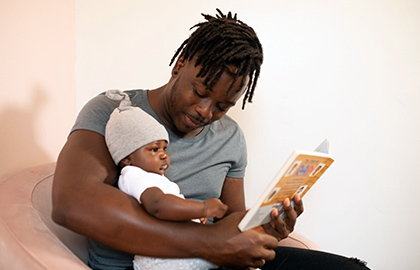How Routines Help You & Your Child

Parents and children have one big thing in common: they feel happier and more peaceful when their days are familiar. Imagine how unsettling it would feel to never know what was happening next--when you would eat, or sleep, or change activities. Learn more about the benefits of routines, some important ones to include in your day, as well as tips on how to get started.
Routines teach self-control
Routines provide limits on fun and not-so-fun activities. By teaching your child that only have a certain amount of time to play on a tablet or outside, the predictability of knowing what is coming will help them to be more prepared when it comes time to transition to a new activity.
Routines help introduce children to healthy habits
Providing structure in childhood helps prepare your family for future self-maintenance. Having your child participate in healthy habits, such as bathing daily or going to bed on time, can help them form lifelong habits. For example, children who practice good dental hygiene are more likely to retain those habits well into adulthood, possibly preventing dental problems later in life.
Routines increase their sense of security and safety
Routines reminds children that they are in a stable environment. If they know what to expect each day, they are less likely to worry about what’s coming. It’s also easier to enforce rules, as they will become common practice. This can reduce stress for everyone.
Routines changes prepare children for unpredictable events
As children grow, their routines will change, too. Adapting their routine to meet their new needs will help your child adjust to other changes more easily. This will come in handy when larger changes occur, like a friend moving away, going to daycare, welcoming a new sibling, or the loss of a loved one.
Tips for establishing a routine for children aged 4 to 23 months:
- Establish a sleeping schedule – this will help you and baby rest at nearly the same time. Determine daily wake time, nap times, and bed time for baby. If you know your baby is due to be asleep from 1 – 3 PM every day, you can plan to accomplish your tasks during this time. You can read more about sleep training here.
- Determining a feeding schedule will also help you maintain a routine. The average breastfed baby feeds about 6 – 8 times a day, and the average bottle-fed baby feeds every 4-5 hours. Feeding right before naps or bedtime can promote better sleep. You can also get more done once they’ve eaten – babies are happier when they aren’t hungry!
Tips for establishing a routine for children aged 2 years and up:
- Keep it simple – Find little ways your child can help with the routine. If they can pick up their toys before dinner, let them do it with little help.
- Review the schedule every morning and evening with your child so they can learn what comes .
- Remind your child that things could change, but will generally stay the same. If your child has to stay home from school or daycare, let them know that they’ll be back in a few days. This can help prepare them for life’s temporary curveballs.
- Offer your child a choice whenever possible. For example, let your child pick from three books you’ve pre-selected at bed time.
